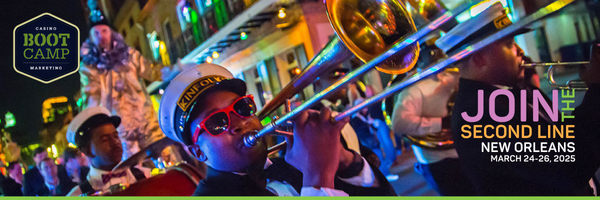When most people think about a brand, they picture a logo, an ad campaign, or a catchy slogan. But those are just the surface. Like an iceberg, the real power of a brand lies beneath the surface. The deeper, often unseen elements—your reputation, customer loyalty, and perceived value—make your brand a critical asset. For casinos, this is especially true, particularly when you consider all the behind-the-scenes systems that create the experience guests have with “the brand.”
Your brand is what customers see and what they feel, expect, and experience whenever they interact with your business. Understanding your brand’s entire value becomes your secret weapon for growth, whether you expand your existing offerings and facilities, enter new markets or branch into online gaming.
Why Brand Valuation is the Key to Casino Growth
But why do some operators appear to expand effortlessly while others struggle to gain traction? It often comes down to brand strength. Marquee names like MGM, Wynn, and Venetian evoke trust, luxury, and excitement—powerful associations that drive customer loyalty and command premium pricing. Yet, smaller, lesser-known entities can achieve the same.
The research underscores this. According to The Economist, brands account for more than 30% of the stock market value of S&P 500 companies. Yet, many casino operators underestimate their brand’s potential, focusing instead on visible metrics like revenue or foot traffic. It’s time to make room in that mindset.
Quick Tip: Assessing Your Brand’s Value
Before exploring or implementing strategies for growth, it is essential to take stock of where your brand currently stands. Assessing your brand value helps you identify strengths, uncover opportunities, and address areas for improvement. Here’s how to get started with practical and actionable steps:
- Survey Your Customers: Go beyond generic feedback. Conduct focused surveys asking loyal patrons why they choose your casino over competitors. Are they drawn to your exceptional service, the atmosphere, or the rewards program? Their answers will reveal what aspects of your brand resonate most.
- Monitor Social Mentions: Your brand’s perception lives inside the walls of your casino and in online conversations. Use social media monitoring tools and news alerts to track mentions, reviews, and comments about your business. Are people praising your customer service or criticizing long wait times? Understanding your digital reputation is crucial for identifying your strengths and weaknesses.
- Compare Pricing Power: One of the most tangible indicators of brand value is your ability to command premium pricing. Compare your slot hold, room rates, food and beverage pricing, or event ticket costs with similar, unbranded competitors. Are customers willing to pay more for your offerings simply because of your name? This signals substantial brand equity.
- Evaluate Business Partnerships: Strong brands attract interest from other businesses. Review how often local companies, event organizers, or vendors seek collaboration with you. Frequent partnership opportunities testify to your brand’s reputation and appeal.
- Analyze Customer Loyalty Metrics: Analyze loyalty program data to measure engagement. How many players frequently redeem points or prioritize your casino over others? Strong participation indicates a high level of trust and affinity for your brand.
- Track Competitor Differentiation: Compare how your customers perceive you against competitors in your market. Is your casino seen as offering something unique or superior? Mystery shop your competitors or collect feedback from customers who have visited multiple venues.
These insights form the foundation for understanding your brand’s tangible (pricing, loyalty metrics) and intangible (reputation, customer sentiment) aspects. With this knowledge, you’ll be better equipped to refine your strategy and maximize your brand’s growth potential.
Understanding What Makes Your Brand Valuable
It is essential to look deeper than surface-level metrics to measure brand value effectively. Three main approaches can help you uncover what your brand is truly worth:
The Income Approach: “Show Me the Money”
The income approach evaluates the direct financial contribution of your brand to your business performance. This method considers the premium customers are willing to pay, revenue streams tied to brand reputation, and the potential for monetizing your brand name through licensing agreements. Key questions to assess include:
- Would customers continue to pay a premium price for your services if your brand name were removed?
- What proportion of your total revenue can be attributed to the trust and recognition associated with your brand?
- Is your brand name strong enough to generate income through licensing or partnerships with other businesses?
For instance, a branded casino hotel in a highly competitive market might charge $50 more per night than an unbranded competitor offering comparable facilities and amenities. Despite the price difference, customers consistently chose the branded property because of the perceived quality and trust linked to its name. This example highlights how a strong brand directly translates into tangible financial benefits.
The Market Approach: “What Are Others Paying?”
The market approach involves comparing your brand’s value to others in your industry, providing benchmarks for how your brand compares. This method examines factors such as acquisition premiums for branded casinos, licensing fees for established brand names, and performance metrics of comparable properties.
Consider the following questions:
- What acquisition premiums have been paid for branded casinos in your region or sector?
- How much are other companies paying to license well-known casino brands?
- How do your property’s key metrics, such as gross gaming revenue, average daily rates and visitation, compare to similar properties in the market?
Suppose a casino operator discovers that a competitor’s brand name is valued higher than the physical assets of their entire property. This realization could lead to a strategic shift in their focus, prioritizing brand development as a critical business asset. Such insights demonstrate how brand equity can outweigh even substantial physical investments.
The Cost Approach: “Building from Scratch”
The cost approach evaluates the resources required to recreate your brand if lost entirely. This method is particularly insightful for understanding the cumulative investment involved in establishing a trusted and recognizable brand. Key considerations include:
- The cost of launching marketing campaigns to build awareness among potential customers
- The investment required to create loyalty programs that establish trust and repeat visitation
- The expense of training staff to consistently deliver on your brand’s promises and customer expectations
- The time and financial resources needed to secure regulatory approvals and build credibility in new markets
A casino operator recently reflected on the unexpected expense of establishing their brand in a competitive market, remarking, “I did not realize how much it would cost just to get customers to trust our name.” The process of brand building—often underestimated—requires a significant commitment but yields enduring value that is difficult to replicate.
Each approach offers unique insights into your brand’s financial and strategic value. By understanding your brand’s contributions through income, market positioning, and the effort it takes to establish trust, you can better appreciate its role as a pivotal asset in your overall business strategy.
How Strong Brands Drive Casino Expansion
A strong brand is a catalyst for growth, enabling casinos to achieve ambitious goals with greater speed and efficiency. Whether entering new markets, strengthening customer loyalty, or exploring new verticals, the power of a trusted brand can provide a significant competitive advantage.
Facilitating Geographic Growth
Expanding into new geographic markets can be challenging, but a strong brand serves as a passport, carrying with it trust, recognition, and credibility. Customers and investors are more likely to embrace a known and respected brand, which reduces barriers to entry and accelerates success.
Consider MGM’s expansion into Asia. These markets are notoriously competitive and heavily regulated, yet MGM’s trusted reputation in the gaming and entertainment industry enabled it to establish itself as a key player. Customers and regulators recognized the brand’s commitment to quality and trustworthiness, paving the way for its success.
A more recent example is San Manuel’s acquisition and operation of the Palms Casino in Las Vegas. As a well-respected tribal gaming operator in California, San Manuel leveraged its reputation to quickly overcome the “new kid on the block” challenge in the highly saturated Las Vegas market. The brand’s established credibility allowed it to bypass many hurdles faced by less-recognized operators, enabling rapid integration into one of the most competitive gaming environments in the world.
Boosting Customer Loyalty
Customer loyalty is the backbone of sustainable growth, and a strong brand is the foundation of that loyalty. A Siegel+Gale study found that 69% of consumers are more likely to recommend brands that offer simpler, more consistent experiences. This translates to repeat visits, word-of-mouth referrals, and reduced acquisition costs for casinos.
A strong brand consistently delivers on its promises, fostering trust and emotional connection with customers. For example, players are more likely to return to a casino they associate with high-quality experiences, personalized service, and seamless interactions across physical and digital platforms. Loyalty is not just a byproduct of exemplary service; it is a direct result of a brand that customers believe in and are proud to endorse.
Expanding into New Verticals
The gaming industry is evolving rapidly, with many casinos venturing into online gaming, entertainment, and other verticals. A strong brand bridges the gap between the familiar and the new in these cases. Customers already familiar with a casino’s physical presence are more inclined to trust its digital offerings or adjacent ventures.
BetMGM provides an exemplary case study. MGM Resorts leveraged its established reputation to create a seamless entry into the online gaming market. By connecting the BetMGM platform to its physical properties and loyalty programs, the company provided a consistent and trusted experience for its players. The brand’s credibility allowed it to stand out in the highly competitive online gaming space, building trust with existing players while attracting new ones.
Similarly, brands expanding into entertainment, such as live shows, dining, or family attractions, can draw on their reputation to drive initial interest and long-term patronage. A strong brand assures customers that new offerings meet or exceed their expectations, making them more likely to engage with unfamiliar products or services.
Think Beyond Casinos – The Coca-Cola Brand
When it comes to brand valuation, Coca-Cola is one of the most iconic examples. While the company owns factories, bottling plants, and distribution networks worldwide, most of its value is tied to its brand rather than its physical assets.
The Coca-Cola name, logo, and customer loyalty represent billions of dollars in value. Interbrand’s 2024 report shows that Coca-Cola’s brand is worth over $61.2 billion. That’s more than its combined production facilities, inventory, and equipment. Why? Because when consumers see the Coca-Cola logo, they associate it with trust, happiness, and quality.
For casinos, the lesson is clear: A strong brand can be worth more than the sum of its physical assets. Whether it is trust in your reputation or the loyalty of your customers, building and leveraging your brand’s intangible value is critical for growth.
Making Your Brand Work Harder
A strong brand is not static; it requires continuous effort to remain relevant, resonate with your audience, and deliver measurable value. Refining your approach and focusing on these core principles can make your brand work harder to support your goals.
Consistency is Non-Negotiable
Every interaction customers have with your brand should reinforce your values and promises. Whether they are stepping onto your gaming floor, browsing your website, or engaging with your social media channels, a consistent experience builds trust and strengthens loyalty.
Inconsistent branding, such as mismatched messaging, uneven service standards, or outdated digital interfaces, can confuse customers and erode trust. Ensure your brand values are reflected across all touchpoints:
- Visual Consistency: Maintain uniform logos, color schemes, and design standards across signage, promotional materials, and digital platforms.
- Service Standards: Train staff to deliver the same level of professionalism and hospitality, whether interacting with a VIP guest in person or responding to a social media inquiry.
- Messaging Alignment: Ensure all communications, from email campaigns to social media posts, align with your brand’s tone, voice, and values.
Just as a luxury casino damages its reputation for premium experiences by sending amateurish promotional emails, an approachable casino brand attempting to project a false sense of luxury can undermine its authenticity and appeal equally. Do not let such disconnects weaken your brand equity.
Embrace Digital Thoughtfully
Your digital presence should be an extension of your physical property, offering the same quality and attention to detail. With customers increasingly engaging with brands online, prioritizing usability and authenticity in digital platforms is critical.
- Integrate Loyalty Programs: Ensure that players can seamlessly earn and redeem rewards across physical and digital channels. A loyalty program that works effortlessly online and in-person keeps customers engaged and reduces friction.
- Active Social Media Engagement: Use platforms like Instagram and Facebook to engage your audience meaningfully. Showcase your property, highlight promotions, and respond promptly to customer inquiries or feedback.
- Optimize for Usability: Regularly test your website and mobile apps for functionality and ease of use. Customers should find it intuitive to book a room, make reservations, or explore promotions online.
A poorly executed digital strategy can frustrate customers and damage their perception of your brand. For example, one operator invested heavily in an app but failed to provide adequate staff training to support its launch. The result was widespread customer dissatisfaction. Approach digital with intentionality to avoid similar pitfalls.
Define and Own Your Niche
No brand can be all things to all people, and the most successful brands focus on excelling in their chosen niche. Clearly define what sets your casino apart and build your strategies around that unique positioning.
- Identify Your Differentiators: What makes your property distinct? Whether it is community-like service, world-class entertainment, exceptional dining, or a boutique luxury experience, identify and emphasize these strengths.
- Clarify Your Brand Promise: Your brand promise is the core of what customers can expect from you every time they visit. Ensure it is clear, compelling, and consistently delivered.
- Deliver Consistently: Regularly revise your operations, staff training, and marketing efforts to ensure they align with your brand promise. Understand how to recognize when your brand comes to life and celebrate those instances.
For example, a regional casino that positions itself as a “community-focused gaming destination” should welcome local events, collaborate with small businesses, and tailor its offerings to the preferences of its local audience. These actions reinforce the brand identity and ensure it remains authentic to its core mission.
When your brand consistently reflects its values, offers seamless digital experiences, and leans into its unique strengths, it becomes a more powerful tool for driving growth and loyalty. Focusing on these actionable strategies ensures your brand works harder to achieve your goals while building lasting relationships with your customers.
The Bottom Line
Your brand is likely worth more than you think, but its full potential may still be untapped. Whether you expand your offerings, enter a new vertical or market, or reevaluate your market position, investing in your brand today will pay dividends tomorrow




Recent Comments